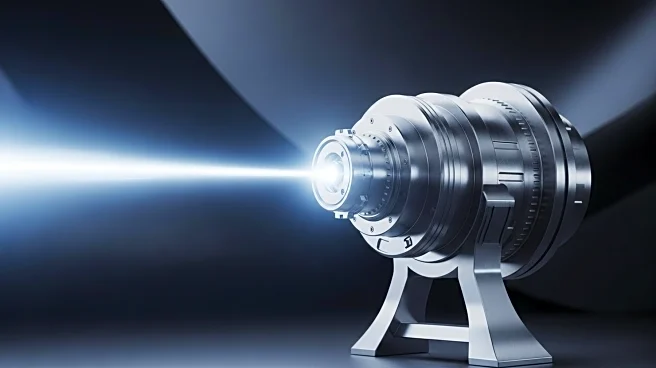What's Happening?
MIT physicists have introduced a concept for a 'neutrino laser,' which could produce bursts of neutrinos by laser-cooling radioactive atoms to temperatures colder than interstellar space. This process would allow the atoms to behave as a single quantum entity, accelerating their radioactive decay and the production of neutrinos. The proposed method could be realized in a tabletop experiment, offering a more compact and efficient way to generate neutrinos compared to current methods involving nuclear reactors and particle accelerators. The team plans to test their idea with a small tabletop setup, potentially paving the way for new forms of communication and enhanced medical imaging.
Why It's Important?
The development of a neutrino laser could revolutionize the way neutrinos are produced and utilized. Neutrinos, being abundant and elusive particles, have significant potential in various fields. If successful, this technology could lead to advancements in communication systems, allowing particles to be sent directly through Earth to underground stations. Additionally, the neutrino laser could provide an efficient source of radioisotopes, enhancing medical imaging and cancer diagnostics. The concept also highlights the potential of quantum coherence in accelerating natural processes, which could have broader implications for scientific research and technological innovation.
What's Next?
The MIT team plans to build a small tabletop demonstration to test their neutrino laser concept. If successful, this experiment could lead to practical applications in neutrino detection and communication technologies. The physicists aim to explore the potential of using this technology for new forms of communication and as a neutrino detector. The success of this experiment could open up new avenues for research and development in particle physics and related fields.
Beyond the Headlines
The concept of a neutrino laser introduces intriguing possibilities for quantum mechanics and particle physics. The use of superradiance in a radioactive Bose-Einstein condensate could lead to accelerated, laser-like neutrino emission, offering insights into quantum coherence and its effects on natural processes. This development could also stimulate discussions on the ethical and safety considerations of manipulating radioactive materials in laboratory settings.










